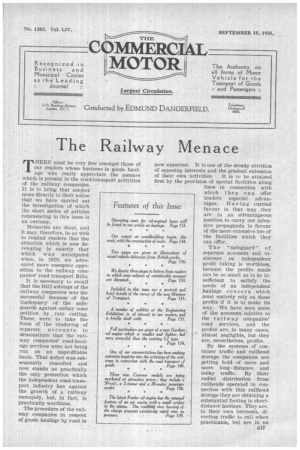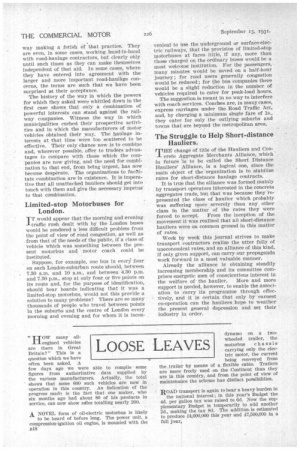The Railway Menace ,
Page 35

Page 36

If you've noticed an error in this article please click here to report it so we can fix it.
THERE must be very few amongst those of our readers whOse business is goods haulage Who really appreciate the menace which is present in the road-transport actiVities of the railway companies.
It is to bring that subject more directly to their notice that we have carried out the investigation of which the short series of articles commencing in this issue is an outcome.
Memories are short, and It may, therefore, be as well to remind readers that the situation which is now developing is exactly that which was anticipated when, in 1928, we advocated more energetic opposition to the railway cornpanics' road transport Bills.
It is necessary to recall that the 1922 attempt of the railway companies was unsuccessful because of the inadequacy of the safeguards against unfair coma petition by rate cutting. These were to take the form of the rendering of separate accounts to demonstrate that the railway companies' road-haulage services were not being run on an unprofitable basis. That defect was subsequently remedied and now stands as practically the only protection which the independent road-transport industry has against the growth of a railway monopoly, but, in fact, is practically worthless.
The procedure of the railway companies in respect of goods haulage by road is now apparent. It is one of the steady attrition of opposing interests and the gradual extension of their own activities. It is to be attained first by the provision of special facilities along lines in connection with which they can offer traders especial advantages. H aving curried favour in that way they are in an advantageous position to carry out intensive propaganda in favour of the more extensive use of the facilities which they can offer.
The " safeguard " of separate accounts and insistence on independent profit taking is worthless, because the profits made can be so small as to be insufficient to satisfy the needs of an independent haulage concern which must entirely rely on those profits if it is to make its way. We have seen• some of the accounts relative to the railway companies' road services, and the profits are, in many cases, almost negligible, but they are, nevertheless, profits.
By the systems of container traffic and railhead storage the companies are getting hold of more and more long distance and bulky traffic. By their radial distribution from railheads operated in connection with this railhead storage they are obtaining a• substantial footing in shortdistance haulage. They are, in their own interests, diverting traffic to rail when practicable, but are In no way making a fetish of that practice. They are even, in some cases, working hand-in-hand with road-haulage contractors, but clearly ohly until such times as they can make themselves independent of that aid. In some cases, where they have entered into agreement with the larger and more important road-hauage concerns, the terms are such that we have been surprised at their acceptance. The hiStory of the way in which the powers for which they asked were whittled down in the first case shows that only a combination of powerful interests can stand against the railway companies. Witness the way in which municipalities curbed their prospective activities and in which the manufacturers of motor vehicles obtained their way. The haulage interests at that time were too scattered to be effective. Their only chance now is to combine and, wherever possible, offer to traders advantages to compare with those which the companies are now giving, and the need for combination to that end, from being urgent, has now become desperate. The organizations to facitate combination are in existence. It is imperative that all unattached hauliers should get into touch with them and give the neceSsary impetus' to that combination.
Limited-stop Motorbuses for London.
IT would appear that the morning and evening traffic rush dealt with by the London buses would be rendered a less difficult problem from the point of view of road congestion, as well as from that of the needs of the public, if a class of vehicle which was something between the present motorbus and motor coach could be Instituted.
Suppose, for example, one bus in ever i four on each London-suburban route should, between 7.30 a.m. and 10 a.m., and between. 4.30 p.m. and 720 p.m., stop at only four, or five points on its route and, for the purpose of identification, should bear boards indicating that it was a limited-stop motorbus, would not this provide a solution to many problems? There are so many thousands of people who travel between points in the suburbs and the centre of London every morning and evening and for whom it is incon venient to use the underground or surface-electric railways, that the provision of limited-stop motorbuses at fares little, if any, more than those charged on the ordinary buses would be a most welcome institution. For the passengers, many minutes would be saved on a half-hour journey; for road users generally congestion would be reduced; for the bus companies there would be a slight reduction in the number, of vehicles required to cater for peak-load hours. The suggestion is meant in TIO way to interfere with coach services. Coaches are, in. many cases, express carriages under the Road Traffic Act, and, by charging a minimum single fare of 1s., they cater for only the outlying suburbs and towns that are beyond the metropolitan area.
The Struggle to Help Short-distance Hauliers.
FT1HE change of title of the Hauliers and Con crete Aggregate Merchants Alliance, which in future 'is to be called the Short Distance Hauliers' Alliance, is a logical one, since the main object of the organization is to stabilize rates for short-distance haulage contracts. It is true that the alliance was formed mainly by transport operators interested in the concrete aggregates trade, but that was because they 'represented the class of haulier which probably was suffering more severely than any other class in the matter of the rates they were forced to accept. From the inception of the movement it was realized that all short-distance hauliers were on common ground in this matter of rates.
Week by week this journal strives to make transport contractors realize the utter folly of uneconomical rates, and an alliance of this kind, if only given support, can carry our propaganda work forward in a most valuable manner.
Already the alliance is obtaining steadily increasing membership and its committee comprises energetic men of conscientious interest in the welfare of the haulier. More and more support is needed, however, to enable the association to carry its programme through effectively, and it is certain that only by earnest co-operation can the hauliers hope to weather the present general depression and set their industry in order.




































































































